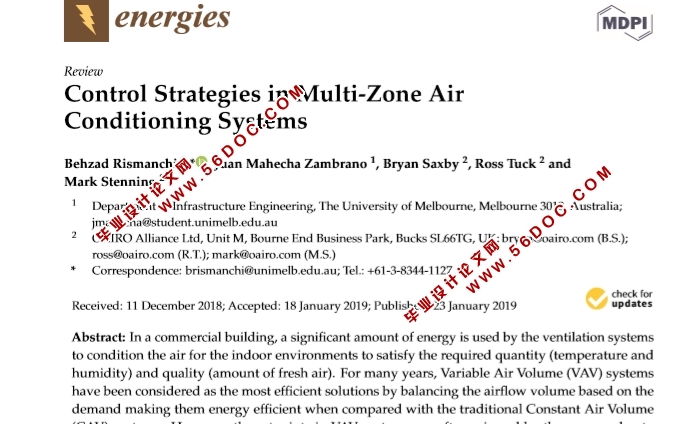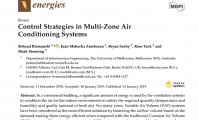多区域空调系统的控制策略
来源:56doc.com 资料编号:5D19955 资料等级:★★★★★ %E8%B5%84%E6%96%99%E7%BC%96%E5%8F%B7%EF%BC%9A5D19955
资料以网页介绍的为准,下载后不会有水印.资料仅供学习参考之用. 密 保 惠 帮助
资料介绍
多区域空调系统的控制策略(中文9000字,英文PDF)
Control Strategies in Multi-Zone Air Conditioning Systems
摘要:
在商业建筑中,通风系统为满足室内环境所需的数量(温湿度)和质量(新鲜空气量),需要消耗大量的能量来调节室内空气。多年来,变风量(VAV)系统与传统的定风量(CAV)系统相比,一直被认为是最有效的解决方案。然而,变风量系统的设定值经常被传感器误读,这是由于污染物的分层和形成,以及对设计水平的反应,过高估计了实时需求条件,导致能源浪费,热不适和不健康的空气。一般而言,变风量设备价格昂贵、复杂且容易发生故障,仅用于大中型项目。最近,解决这一问题的新技术不断发展。在一种新的解决方案中,VAV电机端子被更简单、更便宜的电池所取代,因此可以在更广泛的项目中实现。在系统中,平衡和提供最佳气流以减少能源消耗,同时提供理想的热空气和室内空气质量(IAQ)水平是主要的挑战。本文通过对现有技术与传统变风量系统的比较,为暖通空调领域的研究人员和设计人员提供参考。
关键词:暖通空调;基于压力控制;阻尼器控制;静压复位;二氧化碳复位;需求导向控制;节能;人类福祉;室内空气品质;原子的空气
Abstract: In a commercial building, a significant amount of energy is used by the ventilation systems to condition the air for the indoor environments to satisfy the required quantity (temperature and humidity) and quality (amount of fresh air). For many years, Variable Air Volume (VAV) systems have been considered as the most efficient solutions by balancing the airflow volume based on the demand making them energy efficient when compared with the traditional Constant Air Volume (CAV) systems. However, the setpoints in VAV systems are often misread by the sensors due to stratification and formation of pollutant pockets and responding to design levels that overestimate the real-time demand conditions, which result in waste of energy, thermal discomfort and unhealthy air. In general, VAV devices are expensive, complicated and prone to failures and they are used only in medium and large projects. More recently, new technologies have evolved to solve this issue. In one of the new solutions, VAV motors terminals are replaced with flaps which are simpler and less expensive thus, they can be implemented in a wider range of projects. In systems, balancing and supplying the optimal airflow to reduce the energy consumption while delivering ideal thermal and Indoor Air Quality (IAQ) levels are the main challenges. In this paper, a comparison of the recent technologies with traditional VAV systems is presented to be used as a guild line for researchers and designers in the field of Heating Ventilation Air Conditioning (HVAC).

|



